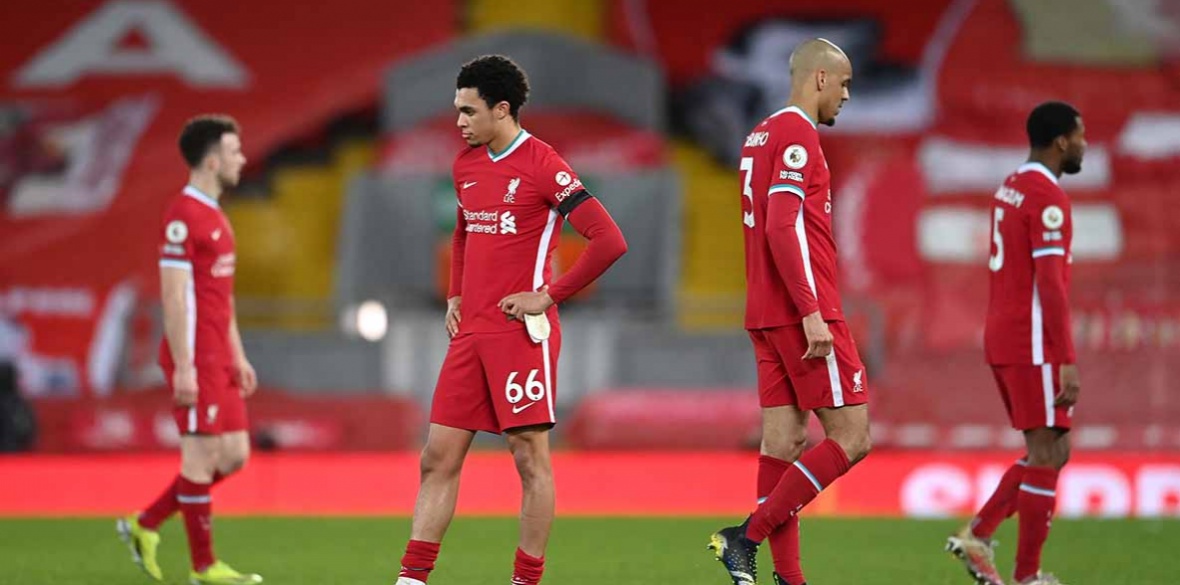This is the last article you can read this month
You can read more article this month
You can read more articles this month
Sorry your limit is up for this month
Reset on:
Please help support the Morning Star by subscribing here
A 1-0 defeat to Chelsea at Anfield on Thursday evening saw Liverpool lose five home games in a row for the first time in their 128-year history. But without supporters present in the stands, is this really Anfield?
Ahead of the Merseyside Derby two weeks ago, this column suggested that the lack of fans inside the old ground gave Everton their best chance of victory since they last won there in 1999. It levelled the playing field and Everton duly went on to win at Anfield for the first time in over 21 years.
Not only have Liverpool lost five consecutive home games for the first time ever, but they are also without a win at Anfield in seven games.
Draws against West Brom and Manchester United preceded defeats to Burnley, Brighton, Manchester City, Everton and Chelsea.
This losing run is all the more remarkable given Liverpool had gone 68 games unbeaten at home in the league prior to that loss against Burnley.
They are also yet to score in open play at Anfield this year, with their only home goal in 2021 coming from the penalty spot in a 4-1 defeat to Man City.
Having celebrated their first league title in 30 years without fans present, Liverpool then had to launch a defence of this title without them too.
The famous sign in the tunnel at Liverpool’s home reads “This is Anfield.” In the words of Bill Shankly, the legendary manager in charge of the club when it was installed, “it is there to remind our lads who they’re playing for and to remind the opposition who they’re playing against.”
It’s now difficult for players to connect with the first part of that statement as they walk out into a vast, empty stadium; devoid of noise, atmosphere and character.
At the moment it could be any stadium in the world. Indeed, Liverpool will play both the “away” and “home” legs of their Champions League round of 16 tie with RasenBallsport Leipzig at the Puskas Arena in Budapest.
The idea of home advantage has dwindled and all stadiums are now neutral venues.
With its cramped schedule, rearranged fixtures and players pushed beyond their limits, football is in danger of becoming little more than content to fulfil TV and sponsorship contracts. Albeit often entertaining content that gives fans watching from home a momentary distraction.
It has not been a good distraction for Liverpool fans, though. Their team are struggling for a number of reasons, all of which have converged to produce a nightmarish title defence.
Injuries to Virgil van Dijk and Joe Gomez in October and November had a domino effect on the rest of the team. Players tasked with covering for the first-choice defensive pair picked up injuries of their own. Midfielders having to drop into the backline affected performances throughout the team before those midfielders themselves picked up injuries.
The club’s recruitment has been much lauded in recent years and played a big part in Champions League and Premier League success, but as the January transfer window opened there were no players lined up to shore up this desperately depleted defence, and the squad seemed thin for a team which recently won the two biggest titles available.
A couple of seemingly panic buys on the final day of the winter transfer window saw Ozan Kabak signed on loan from Schalke and Ben Davies arrive from Preston. Despite Liverpool having been without their two best defenders since mid-November and a transfer window opening on January 2, a replacement didn’t take to the pitch until February 13.
Davies is yet to play a minute of football while Kabak has already had three different centre-back partners in five games — hardly ideal for a 20-year-old looking to settle at a new club.
New signings will also miss the reality of matchday support which is generally much more supportive than the social media equivalent. New signings Kabak and Thiago have already been targeted on these platforms despite being far from Liverpool’s worst performers this season.
Liverpool manager Jurgen Klopp also misses the interaction with supporters and, throughout his managerial career, has spoken on a game by game basis of their importance, giving team talks and encouragement to the fans as well as his players.
On the touchline, Klopp rallies fans as if they were playing, but he now has none to turn to or celebrate with.
Throughout his time at Mainz 05, Dortmund and Liverpool this connection with supporters has led to success against the odds and the idea of a 12th player in the stands has been important to this. The absence of fans has shown at various clubs how important they are, and that the idea of a “12th man” isn’t just a cliche.
On top of this the German’s style of football is one that needs all the energy it can summon, but the lack of motivation from the terraces combined with the intense schedule, injuries and apparent lack of squad depth, has meant Liverpool’s once lauded stars appear to be running on fumes.
Despite Liverpool’s struggles during a season in which they may even fail to finish in the top four, there is hope for the next. The injured players will be back and it is likely that fans will be too. But for the moment, This isn’t Anfield.









